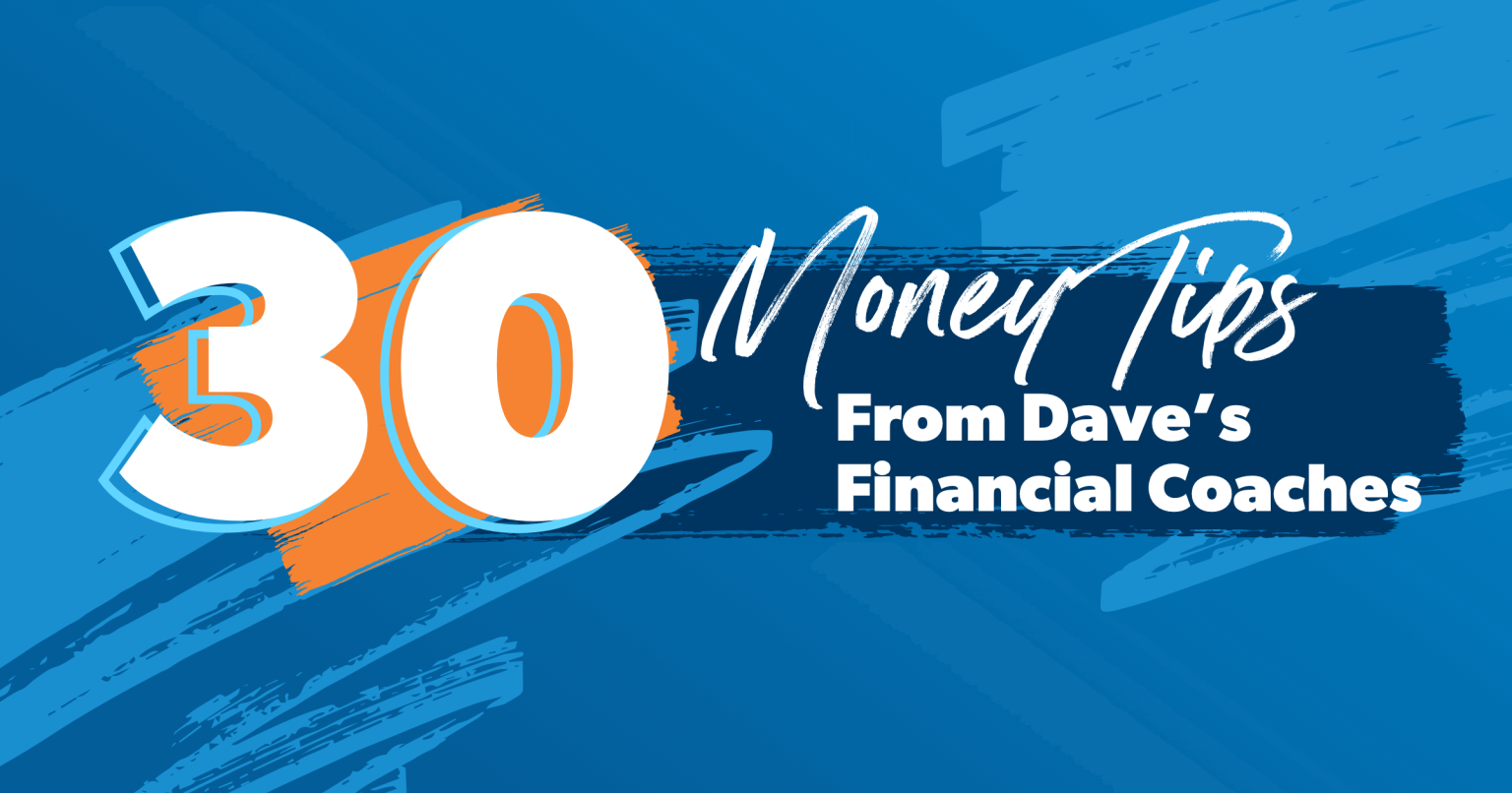Are you ready to learn the secret to getting out of debt? It just takes willpower and a solid plan.
But let’s be honest: It can be hard to keep your eye on the prize during the tough days. That’s why we asked Dave’s in-house team of financial coaches for their best advice on getting rid of debt and building wealth.
These pros are the experts when it comes to money. And they’ve seen, heard and handled it all. Plus, they really want you to succeed. So, here are their top 30 tips to help you do it.
Teamwork
1. Consistently talk with your spouse about money. Make it an ongoing, open dialogue.
2. Sit on the same side of the table when you talk about finances—you’re on the same team.
3. Be patient: Getting out of debt is like turning a sailing ship, not a speedboat.
Budgeting and Spending
4. Use a budgeting app like EveryDollar to help you track your spending and stay on target with your money goals. It takes about three months to get your budget right. So, don’t give up! And remember to make a new budget every single month—and stick to it.
5. Your spending plan will succeed (or fail) based on your spending behavior.
6. One of the most important parts of budgeting is to track your transactions through the month. Tracking helps you stay on top of what you spend and really take control of your money.
Irregular Income
7. It’s a myth that you can’t budget on an irregular income. Anyone can budget—and everyone should budget.
8. If you’ve got an irregular income, budget based on the lowest estimate of what you normally make. (You can adjust later in the month if you make more!)
9. When times are good, put money aside for leaner months.
Creditors and Bankruptcy
10. Talk to your creditors. Work out a realistic repayment plan rather than ignoring the issue.
11. Don’t make a promise to a creditor you can’t keep. Honesty matters!
12. Most people who think they’re bankrupt are actually just scared. Fight the fear, and treat bankruptcy as a last resort.
Retirement
13. Don’t invest until you’ve paid off all your debts and have three to six months of expenses saved up.
14. Stick to growth stock mutual funds.
15. Focus on the things you can control—like how much you’re investing. You can’t predict the market, but you can control your behavior.
16. For extra motivation to get out of debt faster, plug your current debt payments into a retirement calculator. That’ll show you how much your money could be growing if you were investing it instead of sending it to debt payments.
Kids
17. Emotions have a way of directing our spending behavior. When it comes to our kids, guilt is a biggie. Overcome emotional spending. Don’t put anything above your family’s financial foundation.
18. Don’t enable your children. Take a deep breath and say no.
19. It won’t hurt your adult children to pay rent. It may actually inspire them to move out.
Student Loans
20. Don’t count on having your student loans forgiven—they probably won’t be. Do. The. Work.
Pay off debt fast and save more money with Financial Peace University.
21. You don’t want those loans hanging around for decades. Create an aggressive repayment plan instead of paying the bare minimum for 20 years.
22. Not even bankruptcy will erase student loans. So, pay them off as quickly as you can. Here are nine steps for success.
Savings
23. Know the difference between a sinking fund (saving up for big expenses) and an emergency fund (setting money aside for emergencies).
24. Understand what a true emergency is—it’s something unexpected, necessary and urgent. Christmas is not an emergency.
25. Remember, your emergency fund is not an investment—it’s a buffer between you and life.
Money Goals
26. Smart money goals have five characteristics: They’re specific, measurable, time-limited, your own, and written down (preferably somewhere you and others will see them often, like your bathroom mirror or social media account).
27. Follow Dave Ramsey’s 7 Baby Steps. They. Really. Work.
Baby Step 1: Save $1,000 for your starter emergency fund.
Baby Step 2: Pay off all debt (except the house) using the debt snowball.
Baby Step 3: Save 3–6 months of expenses in a fully funded emergency fund.
Baby Step 4: Invest 15% of your household income in retirement.
Baby Step 5: Save for your children’s college fund.
Baby Step 6: Pay off your home early.
Baby Step 7: Build wealth and give.
Financial Tools and Support
28. Watch Financial Peace University (FPU). This course will show you how to pay off debt, save more money, and build wealth for the future. It’s already helped almost 10 million people learn how to win with money!
29. For extra encouragement, make Dave’s proven money principles a part of your daily life. Listen to the Ramsey Network and sign up for our weekly newsletter for ongoing tips, encouragement and practical advice for sticking to your money plan.
30. Talk to a financial coach one-on-one. They can answer your specific money questions, offer accountability, and guide you as you work toward your money goals. Get started with a free consultation.
You’re on the right path to get out of debt forever, build wealth, and live a more meaningful life. We’re excited for you. And here for you. Remember, you can do this! (You really can!)
Read the full article here
